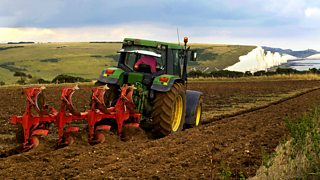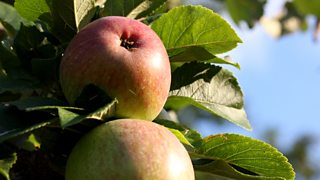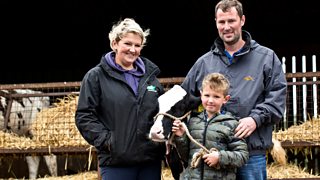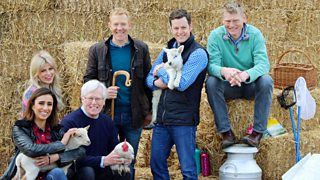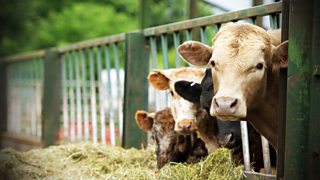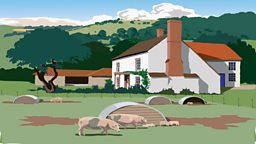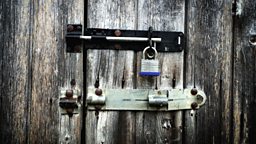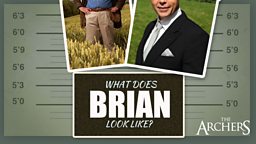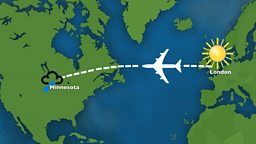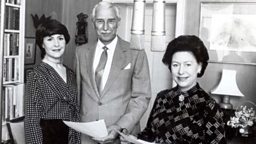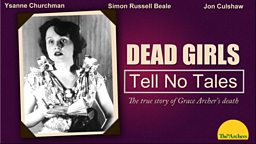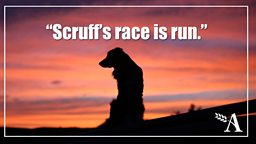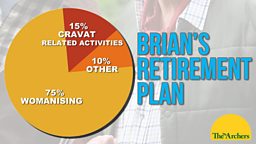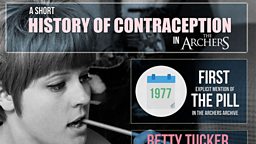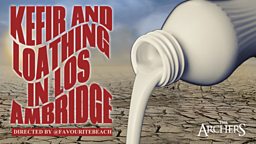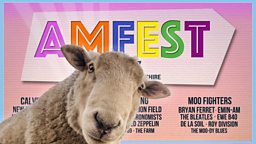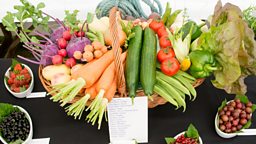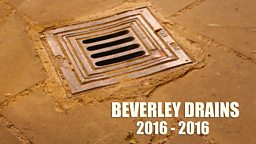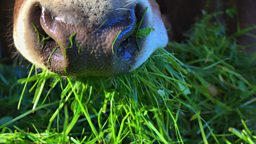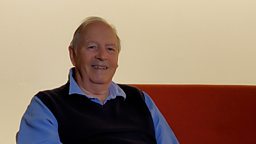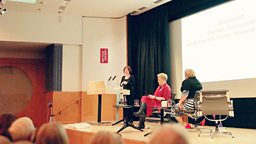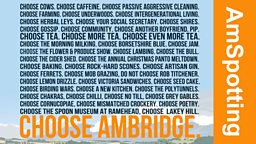Why choose to work in farming?
In The Archers, farming apprentice has been weighing up his options. , his grandfather, has offered him a full-time job on the family farm when he finishes studying. But managing Bridge Farm's organic vegetable production is not what Johnny is really after. Instead he has landed work at ΒιΆΉΤΌΕΔ Farm, an altogether larger operation.
Archers listeners Will Anstee and Emilie Rowe can understand Johnny’s position as they are both at the start of their careers in agriculture. Navigating your way through working life can be hard, whatever industry you are in. Will and Emilie share six reasons why it is all worth it when you are a farmer.
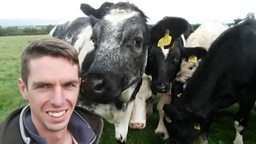
1) YOU WANT TO DO SOMETHING DIFFERENT FROM SCHOOL SUBJECTS
WILL: When I left school I had no idea what I wanted to do. I wanted to break away from any subject that was related to school so I went to agricultural college.
I fancied myself being a property developer so after college I went to do an HND in property and surveying. But being at university was a culture shock and I dropped out after a year. I then became a trainee salesman with a tractor manufacturer but really struggled with that.
I wanted to do something different other than farming but after trying various things and not really settling I thought "maybe I’ll have a go at farming and see how I get on with that". It was the one thing I tried that I thought "actually this is something I could be good at".
EMILIE: I’ve always been interested in animals. After school I wasn’t sure what I wanted to do but I knew it was along the lines of working with animals. I’m from Gloucestershire and I did my A-Levels at Hartpury College which also runs agricultural courses. While I was there I worked on the college’s farm and at its vet practice. I thought about studying zoology.
2) YOU WANT TO SEE THE WORLD
EMILIE: Every country farms, everyone needs to eat. Agriculture can take you anywhere and everywhere. You can explore the world and through agriculture you can learn more about places because farming is a way of life.
I’m not from a farming background at all. I got the bug for it from doing it in New Zealand in my gap year. I did on four different farms, one of which was a dairy farm. When I came home I went back to Hartpury College and did a foundation degree in agricultural business management.
In 2015 my fiancé James Wilson worked for a big seed production company in Canada for a season which he really enjoyed. I was working on a Cotswold outdoor organic pig farm and James was a self-employed contractor but in April 2016 we decided to move to Canada.
I am a bit of a free spirit, I like to go to different places. We both miss our family but from what we have achieved in a year here, I think we’ve done really well for ourselves. We were doing well in the UK but we wanted that extra step of the possibility of us having our own farm.
Will Anstee
- 30 years old
- South Cambridgeshire
- Returned to family farm after working on different farms
- Works with his dad on 250 acres of arable and a herd of 300 beef cattle
- Tried property development and machinery sales before farming
Emilie Rowe
- 24 years old
- Saskatchewan province, Canada
- Always wanted to work with animals, not from a farming family
- First job after studying was on an outdoor organic pig farm
- Moved to Canada, hopes to have her own farm

3) YOU DONβT WANT TO BE IN AN OFFICE (and you donβt want to wear a suit!)
EMILIE: I didn’t think it was enjoyable to get up at 04:00, but it is! When you are up that early to milk the cows you see the sunrises, you see the wildlife. You feel in touch with your surroundings. And you can go back to bed at 08:00!
WILL: At harvest it can be lovely sunny weather and you are at work in shorts and a t-shirt. You can’t beat those moments when the sun starts to go down, the wind drops and the dust coming off the combine sits across the field like mist. It’s sort of like a ghost. It’s magical.
4) YOU LIKE TO KEEP YOUR OPTIONS OPEN
WILL: Being a farmer is a lot more varied work than I think people imagine. Every day is different and you take the rubbish jobs with the good jobs. Sometimes I am sweeping the floor or unblocking a drain but I also get to drive a combine harvester and make things that I need out of what I can find and a bit of welding, which is really satisfying.
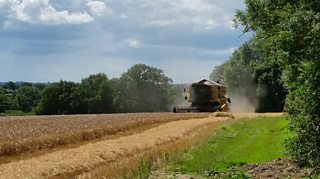
It is so easy to get a degree nowadays and once you have one you probably want to aim for an office job or a supervisory role. The trouble with agriculture is you have to start from the bottom.
EMILIE: Agriculture is such a vast industry you can do anything within it. I’ve gone from looking after pigs in the Cotswolds to managing people’s accounts for their farms in Canada. I don’t think there is another industry that gives you so much choice.
When James left college he started his own business fixing agricultural machinery but that didn’t work out so he became a self-employed contractor. He is now managing a 13,000-acre arable farm in Canada.
The farmers here are not as up-to-date on integrated technology as in the UK. James has implemented technology for yield mapping and building a database of the condition of the fields. They have bought iPads for the tractors. His employer is impressed with the knowledge he has brought from the UK.
With technology progressing in agriculture, young people who are tech-savvy can really contribute to farms and make them excel.
5) YOU WANT TO FOLLOW YOUR OWN PATH
WILL: In farming there’s no really right or wrong way of doing things, even though all farmers are trying to achieve the same thing. We’re all weighing up risks and making decisions. For example, when you need to spray a field, you’re deciding when to do it, considering lots of factors but at some point you have bite the bullet and go off and do it.
Getting away from your comfort zone challenges you and makes you look inside yourself and ask yourself what you really want to do.Emilie Rowe
When you are making decisions about your farm, there is no one there to criticise you or tell you what to do. Every decision can have a big impact on the business. It is not easy and you don’t know if it’s going to work or not. You are doing it entirely yourself and off your own back. And when something does go wrong there is no one to tell you off except yourself! But even if it doesn’t work you have learned from it. That’s how you learn in this job. Not by reading but by actually doing.
EMILIE: The main problem for young farmers is money. Our goal is to own land and farm it ourselves but with the price of land in the UK we couldn’t afford to do it. We were renting and there were lots of other costs which meant we couldn’t save to buy something ourselves.
I loved my job with the pigs but we wanted to see if we could get a bit further. The prospects in Canada are much greater in terms of the price of land. And out here they do specific young farmers loans, which I never came across in the UK.
There are so many more opportunities for young farmers to get really good specialist degrees and get good jobs but we want to do it for ourselves and not being born into farm-owning families it makes it harder for us.
If we really tried we could have made it work in the UK but it is a bit easier here in Canada. Not to say we wouldn’t ever go back and farm in the UK. But right now we would have to work for other people and we really want to set up our own farm.
6) YOU WANT TO SEE THE RESULTS OF YOUR WORK
WILL: For years and years I have been fanatical about harvest, ever since I was a toddler. It has always been a highlight of my year. I understood you have to put in a lot of hard work before you can combine your field of wheat. That excited me – the challenge of having to do all the things to get a field of wheat.
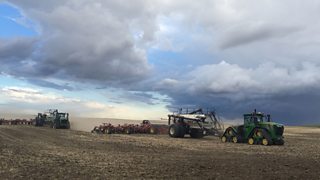
Harvest is the pay-off. Throughout the whole year you are quietly working away and then harvest comes. It gets everybody out to do their bit. You have got this contraption which sits in the shed, the combine-harvester, and you finally get to use it.
You don’t go into farming to make money. It was the lifestyle that drew me to farming. You have got this responsibility of being a caretaker. It is your job to look after the farm so that one day when you hand it over you are passing on a viable business.
You do get a lot of knocks in this job and sometimes you think "why the hell am I doing this?" Margins are tighter, the cost of fuel… There is no such thing as a satisfied farmer but no one is forcing us to do it and we all carry on doing it – it’s our way of life.
EMILIE: We love our animals - they are part of the family, every farmer will say they love their animals. You get up to check that all of them are OK. You see calves being born and you give that animal care for the whole of its life. It is really satisfying. It is a positive job.
There’s always hardship and things that are challenging like injuries and disease. But when you can stand in a field and look at your herd of cows and you can see you’re doing a good job - it feels great. You take pride in what you do.
ADVICE FOR JOHNNY (or anyone starting working life)
EMILIE: Getting away from the family farm I think that will be really good for Johnny because that is going to give him experience in what else is out there. To go off and work on something else is the first step to work out what you really want to do.
Getting away from your comfort zone challenges you and makes you look inside yourself and ask yourself what you really want to do. You’ve got to push yourself in life and take risks. It was a risk for us to come to Canada, but you don’t know if you don’t try.
WILL: My advice for Johnny is to go out and get as much experience as possible. It doesn’t matter what you do as long as you are happy. You’ve got enjoy it.
It doesn’t matter what it is whether it’s farming, accounting or being an astronaut. There is no point in doing it if you’re not happy with the work. And if you work hard enough you can do whatever you want.
What to know more about farming?
-
![]()
The latest news about food, farming and the countryside.
-
![]()
World Wide Opportunities on Organic Farms.
-
![]()
National Federation of Young Farmers' Clubs.
-
![]()
A documentary series following six different Scottish farming families.
-
![]()
Young Farmers talk to Countryfile about their career choice.
-
![]()
Keep track of life in Ambridge with The Archers podcast.
